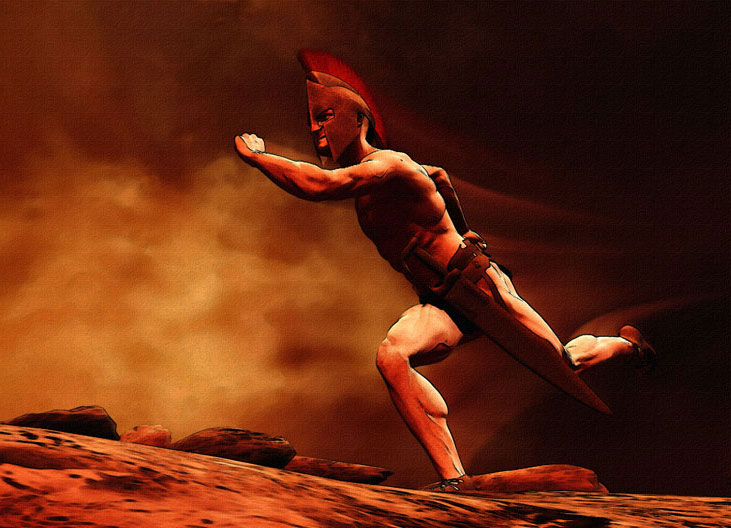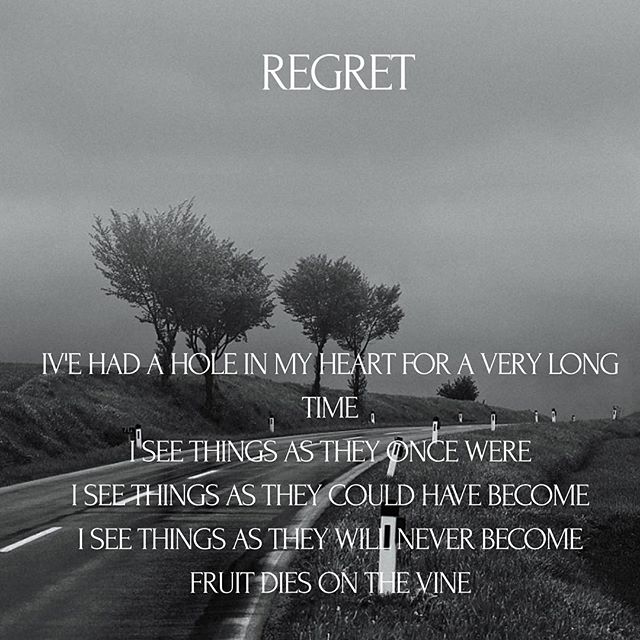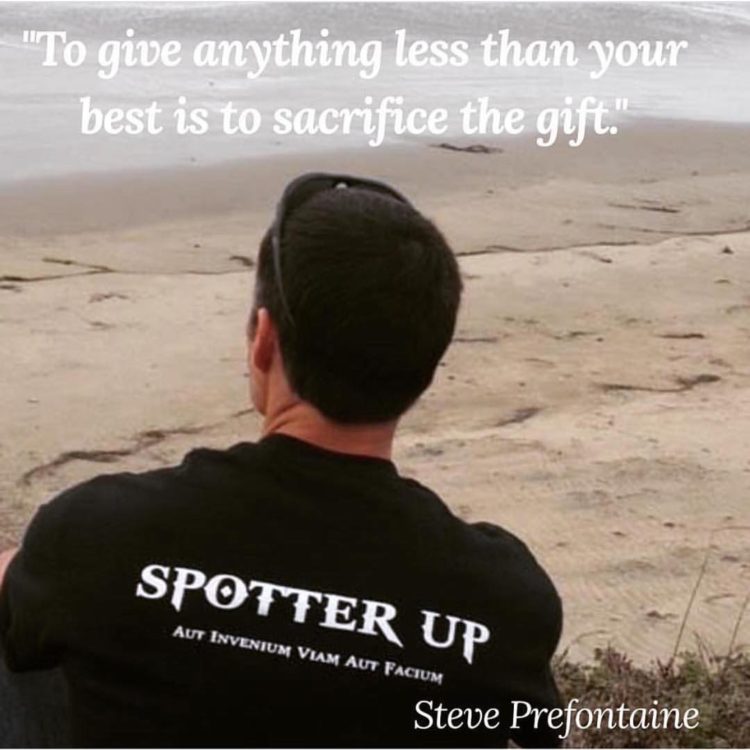Do you remember getting that lump in your throat because you were nervous before executing something? That kind of feeling came from getting on stage in front of people to give an impromptu speech, jumping out of an airplane or going on a mission with your mates for the first time? Do you remember the butterflies that choked you up right before the starter pistol went off during your event at the track meet?
The soldier & English poet Rupert Brooke (August 1887 – 23 April 1915), known for his idealistic war sonnets written during the First World War, especially “The Soldier”, wrote about having a tearing hunger to do and do and do things. He once wrote, “I want to walk 1000 miles, and write 1000 plays, and sing 1000 poems, and drink 1000 pots of beer, and kiss 1000 girls, and—oh, a million things!… The spring makes me almost ill with excitement. I go round corners on the roads shivering and nearly crying with suspense, as one did as a child, fearing some playmate in waiting to jump out and frighten one….”
Brooke’s intense attitude was that of a man trying to transcend the ordinary world through an act of intense attention-and intention. Brooke could only accomplish this by breaking the habitual prison of daily life by contradicting the expected by relishing the unexpected. A man must have a fierce affection for life to feel as Brooke did. In writing this article I am reminded of the brilliant movie “Chariot’s of Fire” and how it moved me deeply. It moved audiences too and earned Best Picture, Director, Music Score, Film Editing and many other Oscars.
The movie focuses on two determined men, a Jew from Lithuania named Abrahams and a Protestant Scotsman named Liddell who is the son of missionaries in China, who are also runners. The movie opens with a 1978 memorial service for one of the men, Harold Abrahams, and then flashes back to sixty years earlier when he was a student at Cambridge. The first movie scene with it’s near silent memorial and the stirring speech given by one of the surviving runners from the movie is moving because it honors all the young men whom came before them. The late movie critic Roger Ebert wrote a wonderful review of the movie and captured its sentiment quite well. He wrote, “The film’s underlying point of view is a poignant one: These men were once young and fast and strong, and they won glory on the sports field, but now they are dead.”
The movie then cuts to a scene of the young men running on the beach and the audience is swept up in the joy the runners are feeling no doubt in part to the great musical score by the artist Vangelis. Many soldiers, of course, didn’t come back from WW1. Nations lost scores of young warrior men who were teachers, artists, scholars, philosophers and poets. The greatest war poet of WWI, Wilfred Owen, was killed one week before the end of the war. He was a gifted writer and an incredible soldier. The movie Chariots of Fire seems to capture the spiritual fire of young men such as Owen, or Abrahams and share that winsome spirit with its audience.
Steve Roland “Pre” Prefontaine (January 25, 1951 – May 30, 1975) was an American middle and long-distance runner. He held four consecutive NCAA track titles at three miles, a feat never before accomplished and American records at every distance from 2,000 to 10,000 meters. He competed in the 1972 Olympics and even today he is admired by many runners, not just because he held the American record in seven different distance track events, but for his grit and lust for life. He went five years without a loss to any American at any distance greater than a mile. Writer Jeff Johnson wrote a great article about Pre. Johnson wrote, “he was going to win, of course. The media portrayed Pre as cocky. But Pre merely had a child’s enthusiasm for his own potential, and a fierce confidence born from the consistency of his training.” Prefontaine died in May 1975 at the age of 24 in an automobile accident in Eugene, Oregon.
During one of the scenes in “Chariot’s of Fire” Abrahams is discussing running with his friend. Abrahams shares his thoughts on the theme of winning and losing. Abrahams tells him, “I don’t know” and states, “I’ve never lost.” Abrahams trained his entire life for the Olympic event and he goes on to state, “You know, I used to be afraid to lose. But now I’m afraid to win. I have ten seconds in which to prove the reason for my existence, and even then, I am not sure I will.” Abraham’s thinking is perceptive in that he realizes his quest for personal glory is coming to a close and his passion to win might dissipate. Personal glory is only so fulfilling and those who move towards it find that emptiness soon follows triumph because it can never fulfill the appetite of the spirit. Accolades can never deliver the fulfillment you want and glory is fleeting. Rockstars will tell you that chasing after that higher high on stage is elusive and the reasons for it are based in self-aggrandizement and narcissism. Juxtapose Abraham’s way of thinking with Liddell’s who states to his sister who chides him for focusing too much on the Olympic gold medal, “Jenny, God has made me for a purpose-for China. But He has also made me fast. And when I run I feel his pleasure.”
The movie speaks to us about men who asserted their own values in a time of classism in Britain when their was prejudice against people belonging to a particular social class. Running set them free from an imposed systematic oppression of subordinated class groups but running gave them far more than that. Liddell goes on to defeat Abrahams who goes on to replay the defeat over and over in his memory. Prefontaine, Abrahams and Liddell had there own reasons and passions for running. Running was a way for those outsiders to be the best individuals they could be. What the movie does best is capture the exhilaration of running as a celebration of the spirit. The movie imbues in us a wistful affection for the past. Watching this movie makes me yearn for returning to some past period or irrecoverable condition and running always brings me there. Movies are good for escapism but athletics prolongs that feeling outside of a room with walls. Running helps me transcend the ordinary world through an act of intense attention-and intention. Prefontaine wrote about the gift. He once stated, “To give anything less than your best, is to sacrifice the gift.” Perhaps it’s not solely about Prefontaine’s gift of running but about the gift of life. We will die one day that is sure.
The poet W.B. Yeats obtained his lyrical power from looking into folklore and myth to make the Irish people aware of their ancient heroic past and that ability to tell stories was passed onto men like lead Pogues singer Shane McGowan and the Waterboys front man Mike Scott. They believed they had something to say just as the runners had something to do. That purpose possessed them and men should have purpose. I believe that somewhere in each man’s genealogy is a heroic or interesting family member who should be studied and then honored. Lean back on those men in your bloodline and emulate them. There has to be something good back there to teach us how to cast long shadows on others. Be proud and if you have no family member to emulate than look at the incredible stable of runners (or any athlete for that matter) throughout history. Runners long have looked at men such as Pheidippides, Jesse Owens, Haile Gebrselassie, Paavo Nurmi or one of my favorites, Marine and runner Billy Mills.
Yeats, the poet, while writing lost himself as he yearned for those moments of peak experience when everything we look upon is blessed. The discipline of performing artistry, no different from the discipline of running becomes a path to freedom and creates an awareness in each of us to open the floodgates to something great. Writing, painting, singing or athletics is a routine that sets you free even if for short moments of time. We can’t live in those moments forever but we can enjoy those peak periods of illumination for a time. I recall my detective buddy finding a rotting corpse stuck to a leather chair months after the dead man overdosed and died where he sat. The house was a typical hoarders pig sty. We are made for much more than that. Fill your time with good and worthy things, but slow down enough to break bad men and bad things, blow stuff up or whatever, just don’t stop living. Live in carnage where you kill life. Get out, ride a speed boat, do some stand up comedy, race a car track, ask someone out on a date…get your pulse racing and do something that puts a lump in your throat. Let anxiety get you going. Make discovery a routine in your life. While we can idolize the past in our moments of nostalgia it is the future we should look forward to. Like Prefontaine have a child’s enthusiasm for your own potential, and a fierce confidence born from the consistency of your training. Work hard at things so you don’t regret not trying out for your dreams.
While I’m on my lecture circuit now I’ll also say have self respect. Believe in what you build. Don’t violate that and you’ll have power. Break it and you’ll find yourself a slave to every opinion. Work with those that want to work with you. Often times people will mistake your youthful earnestness for foolishness or weakness rather than shrewdness. Don’t meander off the path of your purpose or you’ll end up chasing other people’s schemes and regretting it later on. Be humble, be durable, be teachable, build real relationships and the rest will follow. Along the way you’ll meet some good and bad people, sometimes they’re the same people. If it comes time to fight back then be unrelenting, defend yourself, destroy them and salt the earth. Well, maybe not but don’t look back with regret. Relish the future and do the work. Illumination will come. Good luck.
“Fisherman’s Blues” by Mike Scott
I wish I was a fisherman
Tumblin’ on the seas
Far away from dry land
And its bitter memories
Casting out my sweet line
With abandonment and love
No ceiling bearin’ down on me
Save the starry sky above
With light in my head
You in my arms
Woo!
I wish I was the brakeman
On a hurtlin’ fevered train
Crashing a-headlong into the heartland
Like a cannon in the rain
With the beating of the sleepers
And the burnin’ of the coal
Counting the towns flashing by
In a night that’s full of soul
With light in my head
You in my arms
Woo!
Tomorrow I will be loosened
From bonds that hold me fast
That the chains all hung around me
Will fall away at last
And on that fine and fateful day
I will take thee in my hands
I will ride on the train
I will be the fisherman
With light in my head
You in my arms
Light in my head
You in my arms




